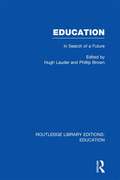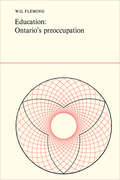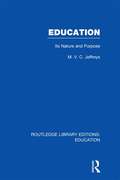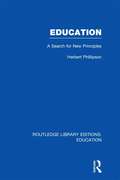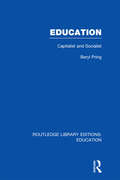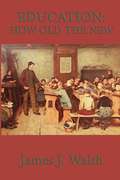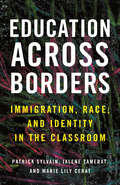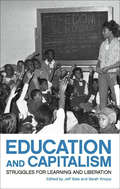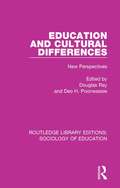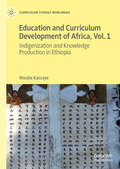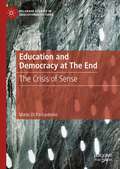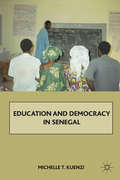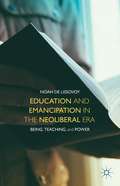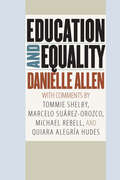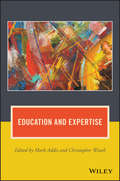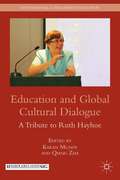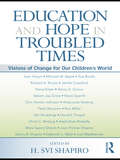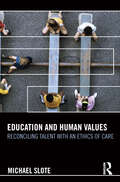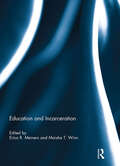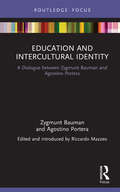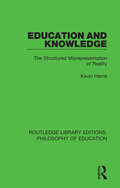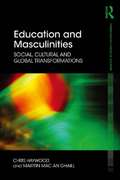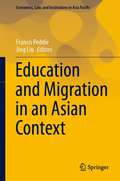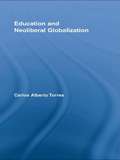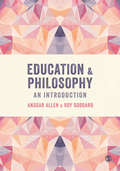- Table View
- List View
Education: In Search of A Future (Routledge Library Editions: Education)
by Phillip Brown Hugh LauderWhat unites the contributors to this book is an opposition to Thatcherite policies on education and an agreement upon the need for the development of democracy in education. This volume highlights the importance of an area of neglected theoretical and practical concern: the development of a critique of the philosophy and policies of the new Right, and of credible alternative policies.
Education: Ontario's Preoccupation
by W. G. FlemingEducation: Ontario's Preoccupation, a companion to the author's seven-volume series, ONTARIO'S EDUCATIVE SOCIETY, reviews the main highlights of educational development in Ontario, concentrating on interpretation rather than statistics. Written for everyone seriously interested in education, whether specialist or general reader, this volume provides an analysis and overview of the key issues that have arisen in education in the last decade and evaluates the prospects for formal education in the future. Among the topics Professor Fleming discusses in detail in this volume are the role of formal education, the expansion of the educational system, the quest for organizational efficiency, the relationship between the province and the universities, educational agencies outside the formal system, research and development, the financing of education, and the questions of religion and language. Education: Ontario's Preoccupation is indispensable as an introduction to the series ONTARIO'S EDUCATIVE SOCIETY, and provides in one volume a compendium of facts and analysis of the main issues in the province's educational development.
Education: Its Nature and Purpose (Routledge Library Editions: Education)
by M VC JeffreysThis book discusses the very nature and purpose of education and provides a foundation upon which more specialized studies in the psychology, history and sociology of education can be based. The book therefore surveys the main problems of human life – the relation of the individual and society, freedom and authority, continuity and change (i.e.growth), and underlying them all, the paradox that aspiration and frustration are continually linked in human experience. The educational implications of these various problems are considered in such a way that the methods as well as the aims of education are discussed.
Education: A Search For New Principles (Routledge Library Editions: Education)
by Herbert PhillipsonContributing to early debates on nature versus nurture, schools and the social environment, town planning and a free comprehensive education, the author discusses key educational issues against the background of a distintegrating Europe in the midst of war.
Education: Capitalist and Socialist (Routledge Library Editions: Education)
by Beryl PringThis book argues that politics, in the sense of the government of our social structure, holds the key to the resolution of educational problems in the early twentieth century; that the teacher will only be relieved of his or her sense of frustration through government and ultimately socialist action. The author looks at the inequality of British education in the early twentieth century and the failure of capitalist education. She suggests measures to change the situation and discusses the aims and methods of socialist education.
Education: How Old the New
by James J. WalshJames Joseph Walsh, M.D., LL.D., Litt.D., Sc.D. (1865-1942) was an American physician and author, born in New York City. He graduated from Fordham College in 1884 and from the University of Pennsylvania (M.D.) in 1895. After postgraduate work in Paris, Vienna and Berlin he settled in New York.
Education Across Borders: Immigration, Race, and Identity in the Classroom (Race, Education, and Democracy)
by Patrick Sylvain Jalene Tamerat Marie Lily CeratA critical resource for K-12 educators that serve BIPOC and first-generation students that explores why inclusive and culturally relevant pedagogy is necessary to ensure the success of their studentsFor readers of White Folks Who Teach in the Hood…And The Rest of Y&’all Too, Education Across Borders is a strong teacher development resource for white educators who serve BIPOC students and are looking for culturally relevant pedagogies that value the diverse experiences of their students. The practices and values in the U.S. educational system position linguistically, culturally, and socioeconomically diverse children and families at a disadvantage.BIPOC dropout rates and levels of stress and anxiety have linked with non-inclusive school environments. In this collection, three educators and will draw on their experiences as immigrants and educators to address racial inequity in the classroom and provide a thorough analysis of different strategies that create an inclusive classroom environment.With a focus on Haitian and Dominican students in the U.S., the authors will reveal the challenges that immigrant and first-generation students face. They'll also offer insights about topics such as: • How do language policies and social justice intersect? • How can educators use culturally relevant teaching and community funds of knowledge to enrich school curriculum? • How can educators center the needs of the student within the classroom? • How can educators support Haitian Creole-speaking students?
Education and Capitalism: Struggles for Learning and Liberation
by Sarah Knopp Jeff BaleEducators examine the state of public schooling, confront the anti-union stance of policymakers, and offer a bold new direction in this essay anthology.A conservative, bipartisan consensus dominates the discussion about what’s wrong with our schools and how to fix them. It offers “solutions” that scapegoat teachers, vilify unions, and impose a market mentality on education. In Education and Capitalism, teacher-activists expose the damaging limitations of this elite consensus and offer an alternative vision of learning for liberation.Co-editors Sarah Knopp and Jeff Bale presents a powerful defense of public education. Other contributors offer historical analysis of school reform with a focus on civil rights and union-led movements. Arguing that today’s schools are designed to serve the needs of capitalism rather than students, this volume offers an action plan for positive change.
Education and Cultural Differences: New Perspectives (Routledge Library Editions: Sociology of Education #44)
by Douglas Ray Deo H. PoonwassieFirst published in 1992, this book looks at the interaction between ideals and reality, with the focus upon social inequality and education in modern society, as well as the possibilities for education to lessen the related problems. The essays in this volume examine three forms of inequality in global society: aboriginal societies in modern industrial states; long-established communities that have been denied full status; and differences arising from recent population migrations. In doing so, it considers how education might support the efforts of all members of society to pursue the goal of equal status for all.
Education and Curriculum Development of Africa Vol. 1: Indigenization and Knowledge Production in Ethiopia (Curriculum Studies Worldwide)
by Woube KassayeThis book, the first of two volumes, focuses on the conceptualization of Indigenous Knowledge and Curriculum, Ethiopian/African Philosophy and the possibilities of Indigenization/Africanization of African Education. Its main purpose is to overview the practices of traditional/indigenous education of Africa with emphasis on Ethiopia’s experience connected with curriculum development, and make possible suggestions that could contribute to curriculum development endeavors of Africa. The cultural heritage of the majority African countries is either ignored or not adequately considered in the formulation of educational policies and curricula in their modern African educational systems. Hence, a new path and paradigm shift are needed. To this end, considering Africa's outstanding IK with useful experiences of other countries in education particularly in the curriculum is critical to bring the required change.
Education and Democracy at The End: The Crisis of Sense (Palgrave Studies in Educational Futures)
by Mario Di PaolantonioThis book grapples with what it means when education and democracy are at an end: when these two foundational aspects of our society seem to have reached a culminating point, no longer appearing to produce and make sense amid the crises of our time. Engaging topical political events and mobilizing a variety of cultural resources, Di Paolantonio shows that today the possibility of the future and the significance of an expansive transgenerational sensibility are radically in question as trends toward destruction, cruelty, and banality are steering world-defying calamities, and sparking “chronopathologies” of doom and despair among the planet’s occupants. Unfolding his argument through a series of accessible chapters that draw on contemporary philosophy, educational thinking, and cultural-artistic works, Di Paolantonio explores how the transgenerational sensibility retains a possibility we might tap for overcoming the impasses of our time.
Education and Democracy in Senegal
by Michelle T. KuenziThis book examines the role of non-formal education (NFE) in promoting democracy in Senegal.
Education and Emancipation in the Neoliberal Era
by Noah De LissovoyThis book describes how neoliberalism as societal philosophy works to limit human potential in our school systems. Analyzing contemporary school reform and control, punishment, and pathologization in schools, this book outlines a theory of emancipation and a process by which pedagogy can build solidarity in classrooms and society more broadly.
Education and Equality
by Danielle AllenAmerican education as we know it today--guaranteed by the state to serve every child in the country--is still less than a hundred years old. It's no wonder we haven't agreed yet as to exactly what role education should play in our society. In these Tanner Lectures, Danielle Allen brings us much closer, examining the ideological impasse between vocational and humanistic approaches that has plagued educational discourse, offering a compelling proposal to finally resolve the dispute. Allen argues that education plays a crucial role in the cultivation of political and social equality and economic fairness, but that we have lost sight of exactly what that role is and should be. Drawing on thinkers such as John Rawls and Hannah Arendt, she sketches out a humanistic baseline that re-links education to equality, showing how doing so can help us reframe policy questions. From there, she turns to civic education, showing that we must reorient education's trajectory toward readying students for lives as democratic citizens. Deepened by commentaries from leading thinkers Tommie Shelby, Marcelo Suárez-Orozco, Michael Rebell, and Quiara Alegría Hudes that touch on issues ranging from globalization to law to linguistic empowerment, this book offers a critical clarification of just how important education is to democratic life, as well as a stirring defense of the humanities.
Education and Expertise (Journal of Philosophy of Education)
by Mark Addis Christopher WinchThe relevance of expertise to professional education and practice is explored in this collection of original contributions from educationalists, philosophers and psychologists. <p><p> Discusses the increasingly prominent debates about the nature of know-how in mainstream analytical epistemology <p> Illuminates what is involved in professional expertise and the implications of a sound understanding of professional expertise for professional education practice, curriculum design and assessment <p> All contributions are philosophically grounded and reflect interdisciplinary advances in understanding expertise
Education and Global Cultural Dialogue
by Karen Mundy Qiang ZhaCultural and spiritual resources are arguably essential to achievement of educational goals, both as economic and political initiatives and as human rights. This book addresses questions surrounding education and inter-cultural understanding in a broad global framework.
Education and Hope in Troubled Times: Visions of Change for Our Children's World (Sociocultural, Political, and Historical Studies in Education)
by H. Svi Shapiro"Progressive educators have always been better at critique than at possibility. This book promises not to ignore critique, but to favor possibility. It is most rare and greatly welcomed." Richard Quantz, Miami University "The editor argues that in a material world, depicted by consumerism, spiritual nihilism and conspicuous consumption, there is need to offer a new vision and direction in education that would promote a more harmonious, holistic values-oriented schooling that transforms persons into moral beings, who care for others…. In terms of innovative ideas and approaches to pedagogy and theorizing about schooling, this volume is at the top of pedagogical discourses and thinking." Joseph Zajda, Australian Catholic University (Melbourne Campus) Education and Hope in Troubled Times brings together a group of the best and most creative educational thinkers to reflect on the purpose and future of public education. These original essays by leading social and educational commentators in North America attempt to articulate a new vision for education, especially public education, and begin to set an alternative direction. This is a time of crisis, but also of renewed possibility—one that offers the opportunity to radically reconsider what is the meaning of education for a generation that will bear the brunt of grappling with the extraordinary dangers and challenges we confront today. At its core this volume questions what will it mean to be an educated human being in the 21st century compelled to confront and address so much that threatens the very basis of a decent and hopeful human existence. Carrying forward a project of redefining and reshaping public discourse on education in the U.S., it is a critical catalyst and focus for re-thinking public policy on education.
Education and Human Values: Reconciling Talent with an Ethics of Care
by Michael SloteTwo of our greatest educational theorists, John Dewey and Nel Noddings, have been reluctant to admit that some students are simply more talented than others. This was no doubt due to their feeling that such an admission was inconsistent with democratic concern for everyone. But there really is such a thing as superior talent; and the present book explains how that admission is compatible with our ideals of caring (and democracy). Traditionalists confident that some disciplines are more important than others haven’t worried that that way of putting things threatens to make those who are excluded feel quite bad about themselves. But an ethics of care can show us how to make these differences much less hurtful and more morally acceptable than anything that has been proposed by traditionalists. So the present book offers a middle way between the denial of the reality of superior talents and an insensitive insistence on that reality. It argues that care ethics gives us a way to do this, and it bases that claim largely on the promise of such an ethics for moral education in schools and in homes. It is argued on psychological grounds that caring can only take place on the basis of empathy for others, and the book shows in great detail how empathy can be encouraged or develop in school and home contexts. Other approaches to moral education—like Kantian cognitive-developmentalism and Aristotelian character education—can’t account for (increasing) moral motivation in the way that an emphasis on the development of empathy allows. And in the end, it is only students educated via care ethics who will be sensitive to one another in a way that largely undercuts the negative psychological impact of educational institutions and practices that acknowledge the greater talents or creativity that some students have.
Education and Incarceration
by Erica R. Meiners Maisha T. WinnThe United States of America is in possession of the largest prison population in the world, with 2.3 million people currently behind bars. This number is predominantly and disproportionately made up of communities of colour and poverty. Between 1987 and 2007, the U.S. prison population tripled; the direct result of various ‘tough on crime’ public policies. Organizers and scholars use the term prison industrial complex (PIC) to name the structure that encompasses the expanding economic and political contexts of the detention and corrections industry in the USA. The PIC is a network that sutures capital, communities and the State to a permanent punishment economy. The term ‘the PIC’ aims to capture the range of material and ideological forces that shape the growth of detention: the political and lobbying power of the corrections officers unions, the framing of prisons and jails as a growth industry in the context of deindustrialization, the production and sales of technology and security required to maintain and expand the state of incarceration, and the naturalization of isolation as a logical response to harm.Education and Incarceration highlights the significance of centering agency and autonomy, and documents scholars who work to be accountable to justice movements and communities, not simply to academic disciplines or to research. Additionally, as emerging scholars committed to challenging the PIC, these authors struggle to build multi-layered analytic and material tools for resistance within and beyond the walls of schools, jails and prisons. This book provides snapshots of practices in motion: activist scholars working to engage, to be accountable to families, communities and larger justice movements, and to build abolition democracies.This book was originally published as a special issue of Race Ethnicity and Education.
Education and Intercultural Identity: A Dialogue between Zygmunt Bauman and Agostino Portera
by Zygmunt Bauman Agostino PorteraEducation and Intercultural Identity offers a dialogue between influential authors Zygmunt Bauman and Agostino Portera that reflects on and discusses contemporary events and issues relating to the crisis of global normativity, education and intercultural identity. Centered around a previously unpublished dialogue between Bauman and Portera, the book contains an extended introduction by Riccardo Mazzeo that traces key themes in the dialogue and highlights the importance of education in our globalized world. The book highlights that intercultural and multicultural education is the best developed model to meet modern day challenges that include religious pluralism, pollution, and conflict. It also contains timely material relating to significant issues affecting society today; including the refugee crisis, rising authoritarian nationalism, and the risks and challenges of globalisation and sustainability. This book will be of great interest for academics, scholars and students in the fields of intercultural education, sociology and the sociology of education.
Education and Knowledge: The Structured Misrepresentation of Reality (Routledge Library Editions: Philosophy of Education #9)
by Kevin HarrisIn this book, first published in 1979, Kevin Harris explores the idea that in capitalist liberal democracies formal education functions essentially not to reveal reality, but rather to transmit to each new generation a structured misrepresentation of reality. In defence of this controversial and thought-provoking view, the author argues that all knowledge of the world is theory-laden and that a neutral, detached, objective description of the world is impossible. This title will be of interest to students of the philosophy of education.
Education and Masculinities: Social, cultural and global transformations (Foundations and Futures of Education)
by Chris Haywood Mairtin Mac an GhaillAcross media, academy and popular culture in western societies there is much talk of an implosion of the modern gender order. Education is often presented as a key site in which a crisis of masculinity is played out, and schools have become a focus for practical attempts to reconcile social and cultural transformations through the recalibration of teaching and learning, increasing male teachers and masculinising the content of subjects. Education and Masculinities argues that we are experiencing a shift from the establishment of the social constitution of gender associated with modernity politics, to the gendering of society that has an intensified resonance among men and women in a global-based late modernity. The book explores the main social and cultural approaches to education and masculinities within the broader context of sex and gender relations, considering the masculinity question alongside local and global changes in society, and bringing a fresh evaluation of key issues. Included in the book: -how the suggestion of ‘academically successful girls’ and ‘failing boys’ plays out in relation to issues of inequality across class and ethnicity -a current empirical analyses of gender inequality across schools, higher education and the labour market -representation, identity and cultural difference with reference to male and female social experiences and cultural meanings -forms of power connected to social divisions and cultural differences. Education and Masculinities provides a critical yet constructive diagnosis of gender relations across educational sites, exploring both academic accounts and alternative global responses that illustrate the limits of Western models and sensibilities.This accessible book will be valuable reading for students following courses in education, sociology, gender studies, and other social sciences and humanities courses.
Education and Migration in an Asian Context (Economics, Law, and Institutions in Asia Pacific)
by Francis Peddie Jing LiuThis edited book explores the complex and multifaceted connections between education and migration in an Asian context from multiple perspectives. It features studies from China, Japan, India, the Philippines, Thailand, and Timor-Leste and covers diverse migration and education experiences. These experiences encompass internal and international migration and forced displacement, as well as questions surrounding education such as school choice, education provision and training as human capital; education and social inclusion; and student performance in a post-conflict context. By covering a wide range of questions and situations, the original scholarship in this book reveals how human development concerns and higher rates of movement within and outside of Asian countries operate on multiple levels in a globalized world.
Education and Neoliberal Globalization (Routledge Research in Education #Vol. 18)
by Carlos Alberto TorresThis volume by noted critical education scholar Carlos Alberto Torres takes up the question of how structural changes in schooling and the growing impacts of neoliberalism and globalization affect social change, national development, and democratic educational systems throughout the world. The first section of the book offers analytical avenues to understand and criticize the practices and policies of neoliberal states, both domestically and internationally. More than a mere lament of the state of educational policy, however, Torres also documents the critiques and alternatives developed by social movements against neoliberal governments and policies. Ultimately, his work urges readers to engage in the struggle to resist the oppressive forces of neoliberal globalization, and proactively and deliberately act in informed ways to create a better world.
Education and Philosophy: An Introduction
by Ansgar Allen Roy GoddardPhilosophy is vital to the study of education, and a sound knowledge of different philosophical perspectives leads to a deeper engagement with the choices and commitments you make within your educational practice. This introductory text provides a core understanding of key moments in the history of Western philosophy. By introducing key transition points in that history, it investigates the plight of present day education, a period in which the aims and purposes of education have become increasingly unclear, leaving education open to the rise of instrumentalism and the forces of capital. Accessibly written, the book carefully analyses the common assumptions and conflicted history of education, provoking questioning about its nature and purposes. The authors argue vigorously that thinking critically about education from a philosophical perspective will give practicing and trainee teachers, as well as students on undergraduate Education and Masters-level courses a fuller command of their own role and context.
